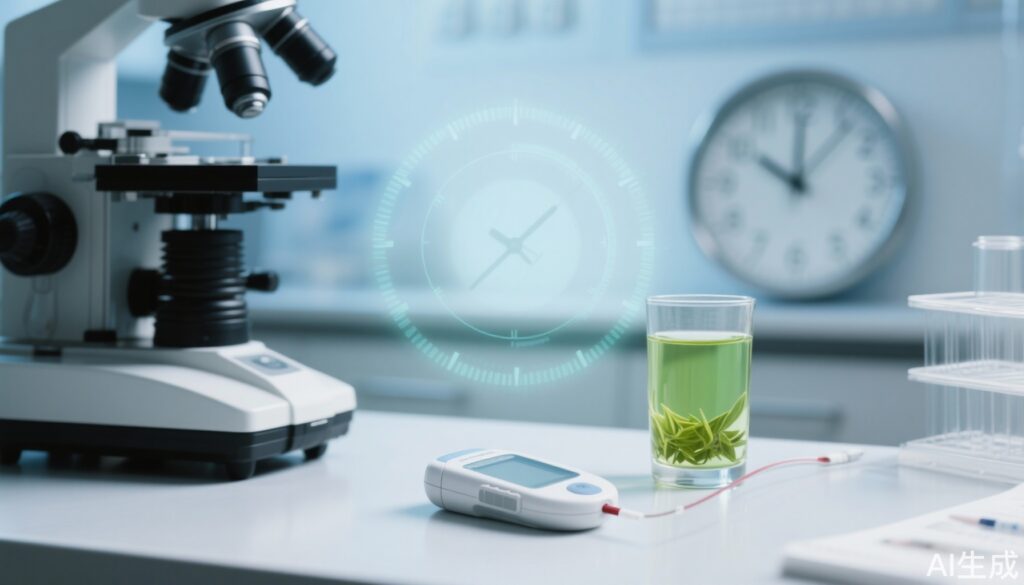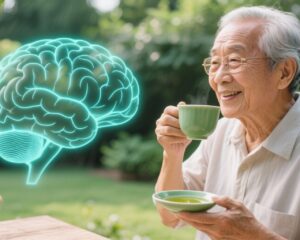Highlight
1. Postprandial glucose concentrations were significantly higher in the evening compared to the morning among healthy adults.
2. Green tea extract incorporated into a starch-rich meal does not alter overall postprandial glucose but significantly reduces peak insulin concentrations 30 minutes post-meal in the morning.
3. Insulin responses show a time-of-day dependency, with green tea (poly)phenols delaying insulin peaks in the morning but not in the evening, reflecting circadian regulation of metabolic responses.
4. These results suggest potential timing considerations for nutritional interventions leveraging green tea polyphenols to improve insulin sensitivity.
Study Background and Disease Burden
Glucose homeostasis in humans is deeply intertwined with circadian rhythms regulated by the biological clock. These rhythms orchestrate metabolic processes to optimize energy utilization throughout the day. Disrupting circadian timing, particularly through mistimed food intake, can impair glucose regulation and may increase the risk of metabolic diseases such as type 2 diabetes mellitus. Postprandial glycemia—the rise of blood glucose following a meal—is a critical determinant of metabolic risk. Interventions that modulate postprandial glycemic excursions have therapeutic potential.
Green tea, rich in polyphenolic compounds such as catechins, has been extensively studied for its beneficial effects on glucose metabolism, including postprandial glycemia reduction. However, little is known about whether these effects vary according to time-of-day, which is important given the circadian influence on insulin secretion and sensitivity. Understanding the temporal dynamics of green tea extract’s impact on postprandial glucose and insulin responses may optimize its use as a nutritional strategy to counter metabolic dysfunction.
Study Design
A randomized, double-blind, placebo-controlled, four-arm cross-over intervention was conducted involving fourteen healthy adult volunteers. Each participant completed four test visits where they consumed either a control meal of white rice or a test meal consisting of white rice enriched with green tea extract. The trials were conducted twice in the morning at 08:00 and twice in the evening at 18:00, on separate days, following an overnight fast.
Blood samples were collected at baseline and multiple intervals up to 180 minutes post-meal consumption. Primary endpoints included incremental area under the curve (iAUC) and peak concentrations for blood glucose and plasma insulin. The study’s crossover design allowed within-subject comparisons, improving statistical power despite the relatively small sample size.
Key Findings
Analysis revealed significantly elevated postprandial blood glucose levels in the evening compared to the morning, irrespective of meal type. Concurrently, insulin levels were lower in the evening, confirming circadian variation in glucose-insulin homeostasis.
Contrary to initial hypotheses, the green tea extract-enriched meal did not significantly reduce the glucose iAUC or alter overall insulin iAUC in either morning or evening sessions compared to the control meal.
Importantly, a significant reduction in peak insulin concentration was observed at 30 minutes after the morning test meal containing green tea extract (mean peak insulin 629 ± 313 pmol/L; P = 0.04) compared to control. This effect was absent in evening sessions.
The findings suggest that green tea (poly)phenols may modulate early-phase insulin release in a time-specific manner, potentially enhancing morning insulin sensitivity without affecting postprandial glucose excursions directly. The lack of effect in the evening aligns with known circadian declines in insulin sensitivity during that time.
Expert Commentary
The study by Sulaimani et al. provides intriguing evidence supporting the notion of chrononutrition—where timing of nutrient intake plays a pivotal role in metabolic outcomes. The observed insulin-sparing effect in the morning may indicate improved beta-cell function or delayed insulin secretion kinetics mediated by polyphenolic compounds in green tea.
Notably, while peak insulin levels were reduced, glucose control was not impaired, underscoring a favorable effect on insulin efficiency or peripheral insulin sensitivity. However, the small sample size and healthy participant cohort limit the generalizability to populations with impaired glucose tolerance or diabetes.
Moreover, while the biochemical mechanisms underlying these time-dependent effects require further elucidation, potential actions include modulation of incretin hormones, antioxidant effects, or influence on insulin receptor signaling pathways influenced by circadian regulators.
Future studies should explore longer-term interventions, diverse populations, and biochemical mediators of the observed effects to better inform clinical recommendations.
Conclusion
This randomized, double-blind, cross-over trial demonstrates that green tea extract consumption with a starch-based meal attenuates peak postprandial insulin responses in the morning but not in the evening, without altering glycemic excursions. These findings highlight the importance of circadian timing in optimizing nutritional interventions aimed at enhancing insulin sensitivity and potentially lowering metabolic disease risk.
Integrating timing strategies into dietary recommendations involving polyphenol-rich foods like green tea could improve therapeutic outcomes for glycemic control. Nevertheless, further research is warranted to confirm these findings in larger, metabolically at-risk populations and to clarify underlying mechanisms.
References
Sulaimani N, Rosbotham EJ, Warnock R, Polzella L, Judowski R, Nicolotti L, Houghton MJ, Williamson G, Bonham MP. Time-of-day-dependent effects of a green tea extract on postprandial glycemia and insulinemia in healthy adults: a randomized, controlled, double-blind, cross-over intervention. Food Funct. 2025 May 19;16(10):4122-4133. doi: 10.1039/d4fo04843a. PMID: 40308148.


